Trichromatic theory - Study guides, Class notes & Summaries
Looking for the best study guides, study notes and summaries about Trichromatic theory? On this page you'll find 108 study documents about Trichromatic theory.
Page 3 out of 108 results
Sort by
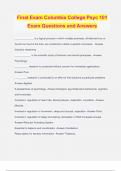
-
Final Exam Columbia College Psyc 101 Exam Questions and Answers
- Exam (elaborations) • 7 pages • 2024
-
- $11.49
- + learn more
Final Exam Columbia College Psyc 101 Exam Questions and Answers ______________ is a logical process in which multiple premises, all believed true or found true most of the time, are combined to obtain a specific conclusion. -Answer- Inductive reasoning ____________ is the scientific study of behavior and mental processes. -Answer- Psychology __________ research is conducted without concern for immediate applications - Answer-Pure _________ research is conducted in an effort to find solu...
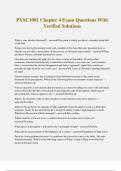
-
PYSC1001 Chapter 4 Exam Questions With Verified Solutions
- Exam (elaborations) • 8 pages • 2024
-
- $11.49
- + learn more
PYSC1001 Chapter 4 Exam Questions With Verified Solutions What is your absolute threshold? - answerthe point at which you detect a stimulus about half of the time Werner was having his hearing tested, and a number of the tones that were presented were so faint he was not able to detect them. What can you say about the faint sounds? - answerThey are below Werner's absolute threshold for sound Giovanni was watching the night sky on a clear evening in November. He noticed that sometimes wh...

-
Biological Psychology 12th Edition by James W. Kalat – Test Bank
- Exam (elaborations) • 61 pages • 2024
- Available in package deal
-
- $11.99
- + learn more
1. Johannes Müller held that whatever excites a particular nerve establishes a special kind of energy unique to that nerve. a. True b. False 2. The coding of visual information in your brain results in an exact duplicate of the object’s shape on the surface of the cortex. 3. The cornea is an adjustable structure in the eye that focuses light. a. True b. False ANSWER: False ANSWER: True DIFFICULTY: Bloom’s: Understand REFERENCES: General Principles of Perception LEARNING OBJEC...
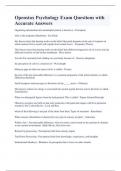
-
Openstax Psychology Exam Questions with Accurate Answers
- Exam (elaborations) • 7 pages • 2024
- Available in package deal
-
- $7.99
- + learn more
Openstax Psychology Exam Questions with Accurate Answers Organizing information into meaningful pattern is known as - Perception what is the tympanic Membrane - Ear Drum this theory states that hearing works on the belief that pitch depends on the rate of response in which neurons fire in synch with signals from sound waves. - Frequency Theory This theory states that hearing works on the belief that different frequencies of air waves activate different locations on the basilar membra...
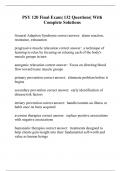
-
PSY 120 Final Exam| 132 Questions| With Complete Solutions
- Exam (elaborations) • 15 pages • 2023
- Available in package deal
-
- $12.99
- + learn more
General Adaption Syndrome correct answer: alarm reaction, resistance, exhaustion progressive muscle relaxation correct answer: a technique of learning to relax by focusing on relaxing each of the body's muscle groups in turn autogenic relaxation correct answer: Focus on directing blood flow toward tense muscle groups primary prevention correct answer: eliminate problem before it begins secondary prevention correct answer: early identification of disease/risk factors tertiary...
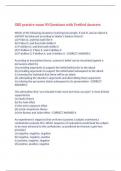
-
GRE practice exam 90 Questions with Verified Answers,100% CORRECT
- Exam (elaborations) • 22 pages • 2023
-
- $11.39
- + learn more
GRE practice exam 90 Questions with Verified Answers Which of the following situations involving two people, P and O, and an object X, will NOT be balanced according to Heider's balance theory? (a) P likes O, and they both like X (b) P likes O, and they both dislike X (c) P dislikes O, and they both dislike X (d) P dislikes O, P likes X, and O dislikes X (e) P dislikes O, P dislikes X, and O dislikes X - CORRECT ANSWER C According to inoculation theory, a person's belief can be inoc...
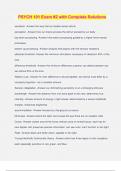
-
PSYCH 101 Exam #2 with Complete Solutions
- Exam (elaborations) • 13 pages • 2024
-
- $12.49
- + learn more
PSYCH 101 Exam #2 with Complete Solutions sensation -Answer-the way that our bodies sense stimuli perception -Answer-how our brains process the stimuli sensed by our body top-down processing -Answer-information processing guided by a higher-level mental processes bottom-up processing -Answer-analysis that begins with the sensory receptors absolute threshold -Answer-the minimum stimulation necessary for detection 50% of the time difference threshold -Answer-the minimum difference a person...

-
NATS 1870 FINAL EXAM REVIEW
- Exam (elaborations) • 21 pages • 2024
-
- $11.49
- + learn more
NATS 1870 FINAL EXAM REVIEW through accommodation, your eye can change its refractive power to help it focus images by changing the shape of the lens itself, via attached ciliary muscles contracting or relaxing it (lesson 13) we have blurry vision in water (such as in a swimming pool) because cornea itself is mostly made of water, reducing the difference in indices of refraction (lesson 13) a person born with no (functioning) retina in his eyes would be completely blind (lesson 13) alth...
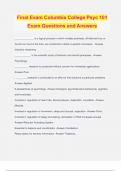
-
Final Exam Columbia College Psyc 101 Exam Questions and Answers
- Exam (elaborations) • 7 pages • 2024
-
- $11.49
- + learn more
Final Exam Columbia College Psyc 101 Exam Questions and Answers ______________ is a logical process in which multiple premises, all believed true or found true most of the time, are combined to obtain a specific conclusion. -Answer- Inductive reasoning ____________ is the scientific study of behavior and mental processes. -Answer- Psychology __________ research is conducted without concern for immediate applications - Answer-Pure _________ research is conducted in an effort to find solu...
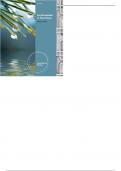
-
Test Bank For An Introduction to Psychology, International Edition 4Th Edition by Jeffrey Nevid
- Exam (elaborations) • 635 pages • 2023
-
- $32.86
- + learn more
CHAPTER 3 Sensation and Perception MULTIPLE CHOICE 1. The process by which we receive, transform, and process stimuli is: a) sensation. b) perception. c) transduction. d) reduction. e) psychophysics. ANS: a TOP: MOD: 3.1 REF: Sensing Our World: Basic Concepts of Sensation MSC: factual KEY: Identify 2. In a) b) c) d) e) contrast to sensation, perception involves: converting external stimulation intro signals the brain can use. channeling sensory information to the appropriate part ...

How did he do that? By selling his study resources on Stuvia. Try it yourself! Discover all about earning on Stuvia


